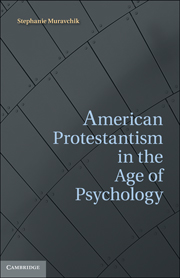Book contents
- Frontmatter
- Contents
- Acknowledgments
- Abbreviations
- 1 The Fall and Rise of Psychoreligious Cooperation
- PART ONE THERAPY AS MINISTRY IN CLINICAL PASTORAL EDUCATION
- PART TWO THERAPY AS FELLOWSHIP IN ALCOHOLICS ANONYMOUS
- 4 Democracy Is a Therapy
- 5 Came to Believe
- PART THREE THERAPY AS EVANGELISM IN THE SALVATION ARMY
- Bibliography
- Index
- References
4 - Democracy Is a Therapy
from PART TWO - THERAPY AS FELLOWSHIP IN ALCOHOLICS ANONYMOUS
Published online by Cambridge University Press: 05 July 2011
- Frontmatter
- Contents
- Acknowledgments
- Abbreviations
- 1 The Fall and Rise of Psychoreligious Cooperation
- PART ONE THERAPY AS MINISTRY IN CLINICAL PASTORAL EDUCATION
- PART TWO THERAPY AS FELLOWSHIP IN ALCOHOLICS ANONYMOUS
- 4 Democracy Is a Therapy
- 5 Came to Believe
- PART THREE THERAPY AS EVANGELISM IN THE SALVATION ARMY
- Bibliography
- Index
- References
Summary
The situation that New York businessman and habitual drunkard Bill Wilson faced one Saturday afternoon in 1935 was a relatively new one in his drinking career. He found himself standing in a hotel lobby staring pathetically at a lively, patron-filled bar. The sounds of intoxicated hilarity sorely enticed him as he desperately tried to master an almost overwhelming urge to buy a drink. He had a half year of sobriety under his belt, but none of his other bouts of dryness had ever lasted very long during his two decades of destructive drinking. Thus, he was in for a struggle – one he had never won before. To make matters worse, he was in Akron, OH, far from friends and home. He was there pursuing a business opportunity in the hopes of salvaging his shattered financial and professional life.
A man in Wilson's shoes had few places to turn in 1935. In the first half of the twentieth century, a variety of institutions housed alcoholics – psychiatric asylums, hospitals, sanitaria, inebriate farms and colonies, skid row missions, and prisons – but few did more than help a drunk dry out temporarily. No one seemed to know how to keep someone like Wilson on the wagon for good. Wilson himself had done numerous stints in hospitals, to no avail. After each release, he had returned to drinking sooner or later. Physically impeding access to alcohol via confinement or geographical isolation was the alcoholic's main hope.
- Type
- Chapter
- Information
- American Protestantism in the Age of Psychology , pp. 83 - 111Publisher: Cambridge University PressPrint publication year: 2011

